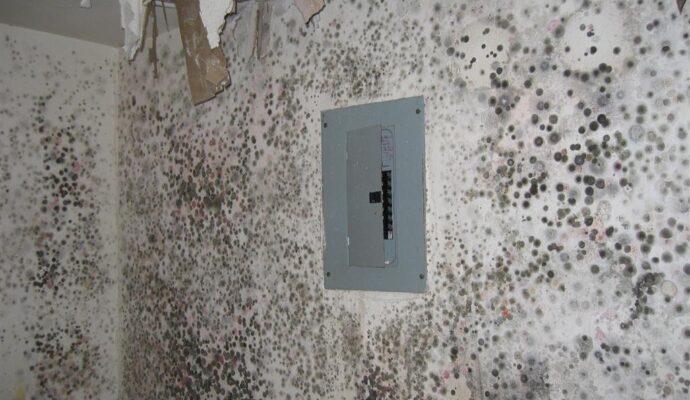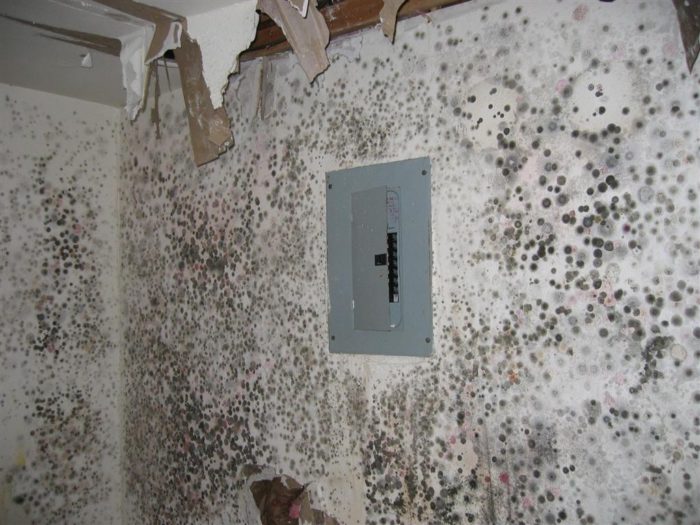Mold Removal
Contact Us

Mold can grow anywhere on a carpet, clothing, food, paper, and even in places you can’t see, such as the backside of drywall, areas inside walls around leaking or condensing pipes, and above ceiling tiles; as long as there are moisture, oxygen, and organic material present.
Mold can be good because it is necessary for the decomposition of organic matter in nature as well as making brie and penicillin and but it can also be worse, especially when it grows undetected in your home. Molds interfere with the longevity and aesthetics of items. Not only is a mold problem difficult and costly to fix, but it can also produce allergens and irritants that may compromise your health.

Mold spores spread fast, and it is not easily eradicated hence the best approach is to prevent mold before it becomes a problem. Moisture control is the most important aspect to observe if you intend to avoid molds.
South Florida Contracting Services outlines some of the ways to curb mold growth in a building;
- – Identification of damp areas and correcting them: Preventing mould from growing or spreading might be as simple as ripping up the carpet in a wet basement, installing mold-resistant products, checking and repairing leaks in the drainage system or repairing damaged gutters. Or it may be a matter of significant excavation and waterproofing. It might cost some money up front, but it will surely be more costly down the road if mould continues to grow unchecked.
- – Proper drainage around the home: If the ground around your house isn’t sufficiently sloped away from the foundation, water may collect there and seep into your crawlspace or basement. Ensure there is proper drainage around every building in your vicinity.
- – Dry, wet areas within the shortest time possible: Mold can’t grow without moisture, therefore, tackle wet areas right away. Flooding or seepage into the basement, accumulation from a leaky pipe, even a spill on the carpet, ensure it dries within 24 to 48 hours. If you’ve experienced a flood, remove water-damaged carpets, bedding, and furniture if they can’t be thoroughly dried. Avoid leaving wet items lying around the house or wet clothes in the washing machine, where mold can spread quickly.
- – Improve airflow in your home: According to the EPA, as temperatures drop, the air can hold less moisture. To increase circulation, open doors between rooms and move furniture away from the walls to let in the fresh air, reduce humidity and keep mold at bay.
- – Proper ventilation: Providing adequate ventilation in your bathroom, kitchen, laundry room, and any other high-moisture area is vital in mold prevention. Vent appliances that produce moisture like clothes dryers and stoves to the outside. Use AC units and dehumidifiers especially in humid weather, but make sure to maintain them as directed by the manufacturer.
- – Equip your home with mold-resistant products: Use Mold-resistant products in mold prevention and mold control. Use mold-resistant products like mold-resistant drywall or mold-resistant Sheetrock when building and mold inhibitors for paints. Moisture-resistant drywall is especially valuable in areas prone to wetness, such as basements, bathrooms, laundry rooms, and kitchens. The core of the drywall is developed in such a way as to prevent moisture absorption, and thus prevent mold growth.
- – Monitor humidity indoors: Humidity can be monitored using a moisture meter. The EPA recommends keeping indoor humidity between 30 and 60 percent. Some of the signs of excessive moisture include condensation on windows, pipes, and walls, hence the need to dry out the surfaces.
Treating areas of existing mold growth should always be done while wearing a respirator or mask rated for work with mold spores, and arms, legs, and hands should be covered to prevent an allergic reaction. After removing any moldy debris such as sub-flooring or drywall, treat the hard surfaces with commercial mold control products containing bleach or ammonia, which can help to eradicate any surviving mold.
For continued mold prevention in problem areas, you can apply vinegar one to two times a week. Vinegar makes areas too acidic for mold growth and can prevent moldy buildup in areas like showers and sinks. A regular scrub of the field with borax and water will also help to prevent and control mold growth. Always follow the manufacturer’s directions for the correct mixture ratio.
Mould in homes can cause significant damage and even health risks, but by understanding the range of mold control and mold prevention products available, you’ll be equipped to keep your home mold-free. For more information and the best solution to the mold, menace contact the South Florida Contracting Services.
Website Services Offered by South Florida Contracting Services
-
Aluminum Fences
-
Aluminum Roofs
-
Aluminum Screen Enclosure
-
Bath Tub Reglazing & Tub Resurfacing Contractors
-
Best Roofing Contractor in West Palm Beach
-
Carports & Awnings
-
Chain Link Fences
-
Commercial Custom Tile Installation
-
Commercial Fence Installation
-
Commercial Flat Roof Installation
-
Commercial Flooring
-
Commercial Painting
-
Commercial Popcorn Removal
-
Commercial Roofing
-
Commercial Screen Enclosures
-
Concrete Brick Pavers
-
Concrete Brick Pavers
-
Concrete Driveways
-
Concrete Driveways
-
Concrete Grinding
-
Concrete Overlayment
-
Concrete Polishing
-
Concrete Sidewalks
-
Concrete Underlayment Service Pros
-
Cork Floors
-
Corso Premium Screen Enclosure
-
Crown Moldings
-
Custom Concrete and Countertop Solution
-
Custom Tile Installation
-
Drywall Installation
-
Drywall Repair
-
EIFS Repairs
-
Engineered Floors
-
Epoxy Floor Finishing
-
Fence Repair & Replacement
-
Fire Damage
-
Flooring Repairs
-
Glass Rooms
-
Hardwood Floor Repair
-
Hardwood Floors
-
Install Pet Screens
-
Iron Fences
-
Kitchen & Bath Remodeling Service Solutions
-
Kitchen & Custom Bath Home Remodeling Pros
-
Knockdown Texture
-
Laminate Floors
-
Lanai Conversions
-
Lattices
-
Masonry
-
Masonry
-
Metal Roofing
-
Mold Removal
-
Orange Peel Ceilings
-
Outdoor Enclosures
-
Patio Covers
-
Patio Screen Enclosures
-
Pergolas
-
Phifer Screen
-
Pool Screen Enclosure Installation and Repairs
-
Pool Screen Enclosures
-
Popcorn Removal and Finish Removal
-
Privacy Walls
-
PVC Fences
-
Regular Roof Maintenance
-
Repair Screen Enclosure
-
Residential Custom Tile Installation
-
Residential Painting
-
Residential Popcorn Removal
-
Residential Roofing
-
Retaining Walls
-
Roll-Down Screen
-
Roof Lead Repairs
-
Roof Repairs
-
Shingle Roofs
-
Smooth Ceiling Finish
-
Solariums
-
Spa & Hot Tub Screen Enclosure
-
Stack CBS
-
Stucco and EIFS
-
Stucco Repair
-
Stucco/EIFS
-
Sunrooms
-
The Types of Tiles
-
Tile Installation & Contractor
-
Tile Maintenance
-
Tile Repair
-
Tile Roofs
-
Vinyl Fence
-
Water Damage
-
Water Heater Install and Replacement Services
-
Water Restoration
-
Wood Fences
Request for a free quote from our contracting service company now!

